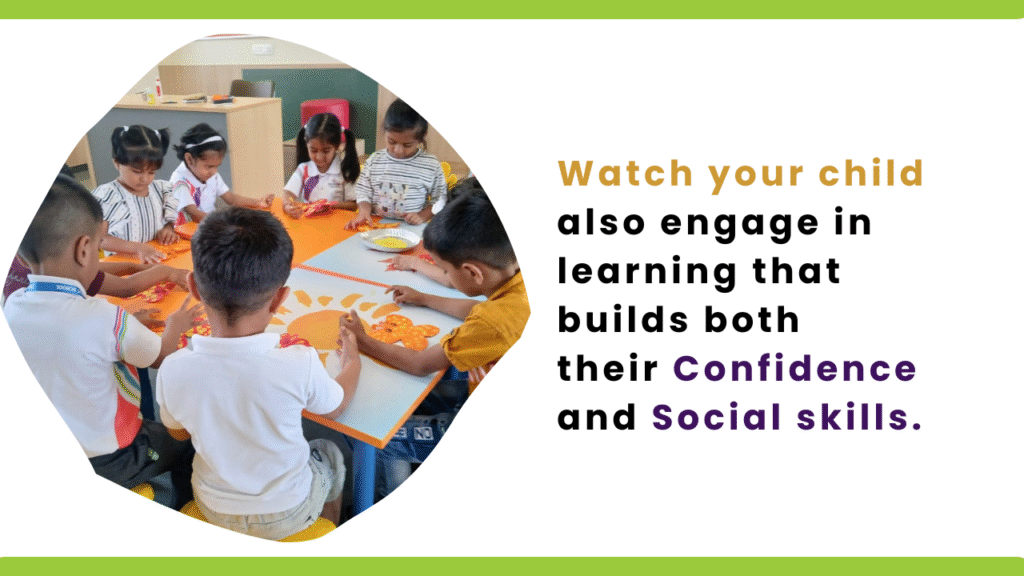Introduction
Social skills are what help children connect with others. They’re the key to making new friends, sharing feelings, and learning from the world around them. But there’s another important piece of the puzzle, and that’s confidence!
Confidence is not just what allows kids to interact with others effectively, but also what helps them build meaningful connections.
As a parent, have you ever wondered how well your child socialises with others? How do they interact with the people around them?
Take a moment to think about it. These small observations can tell you a lot about their confidence and social skills. By the time you finish reading this blog, you’ll have a better understanding of these questions and how to help your child grow in these vital areas.
Let’s first understand why confidence is necessary and how it plays a crucial role in helping your child build social skills.
Table of Contents
Why Confidence?
Think about your child at a birthday party. In the past, they might have stood back, feeling nervous and unsure about how to join in with others. Now, imagine them walking up confidently, introducing themselves, and happily joining the group! This change is driven by confidence, it encourages them to take initiative, interact comfortably, and build the social skills needed to form meaningful connections.
Did you know there are 3 key social skills every child needs to thrive and build meaningful connections? Let’s discover what they are!
Key Social Skills for Kids
Communication Skills: Clear expression and good listening help kids connect and build stronger relationships.
Empathy: Understanding and sharing others’ feelings not only builds trust but also creates meaningful bonds.
Cooperation and Teamwork: Working well with others and sharing ideas teaches kids the value of connection and helps friendships grow.

Here are some other essential skills that are crucial for your child’s growth and social success. Let’s take a closer look!
✔ Problem-Solving Skills
For example, if your child can’t find a toy, they’ll think of a way to look for it or ask for help, instead of getting upset. This skill helps them resolve issues independently.
✔ Respect and Courtesy
When your child says “please” and “thank you,” they show kindness and respect, which strengthens their relationships with others.
✔ Self-Control
If your child loses a game, instead of getting angry, they stay calm and congratulate the winner. This helps them manage emotions in social settings.
✔ Active Participation
In a group activity, an actively participating child will join in and share ideas, making them feel involved and connected to others.
Now that you’ve gained a better understanding of confidence and social skills, let’s dive into how you can help your child build their confidence and improve their social skills.
To help your child effectively, you first need to understand the root causes: why, where, and when they lack confidence. The same applies to social skills; knowing what holds them back from socialising will guide you in supporting them better.
Identifying the Root Causes
| Root Cause | Why It Happens | Where It Affects | When It Becomes Noticeable |
| Lack of Confidence | Due to past failures or constant comparisons. | At school, during activities, or in public settings. | When trying new tasks or facing challenges. |
| Limited Social Exposure | Few opportunities to engage with peers. | Playgrounds, group events, or team activities. | When around unfamiliar groups or environments. |
| Overprotection by Parents | Shielding them from challenges or decisions. | At home or in controlled settings. | When faced with independence or problem-solving. |
| Communication Barriers | Difficulty in expressing thoughts clearly. | Conversations, group discussions, or public speaking | When asked to share ideas or express feelings. |
| Fear of Judgement | Worrying about criticism or rejection. | Among peers or in competitive environments. | When seeking approval or feedback from others. |
Now, we are going to see key strategies to help your child build confidence.
Helpful Strategies to Build Their Confidence
Strategy: “Encourage Problem-Solving”
How It Helps
Helps them handle challenges and feel capable of solving problems on their own.
Example:
Let them organise a small family activity, like deciding what to cook for dinner. By trying this, your child will feel not just independent but also confident in making decisions. The best part of this strategy is that they’ll approach challenges with a positive mindset. Plus, this practice will promote belief in their ability to overcome those challenges. They’ll also learn to take responsibility for their choices
Strategy: “Give Space to Explore”
How It Helps
Lets them discover their talents and passions, which increases self-belief.
Example:
Enrol them in different activities like art, music, or sports and let them choose what they love.
They’ll gain confidence from mastering new skills and feel proud of their individuality. This exploration also helps them realise their potential.
Strategy: “Celebrate Mistakes as Lessons”
How It Helps
Helps them see failure as an opportunity to grow, not a setback.
Example:
Share a time when you made a mistake and what you learned from it.
They’ll approach challenges with resilience, knowing mistakes are part of learning. This perspective will help them try new things without fear of failure.
Strategy: “Help Them Know Themselves”
How It Helps
Encourages self-awareness, so they recognise their strengths and work on areas for improvement.
Example:
Do an activity where they list things they are proud of and discuss what makes them unique.
They’ll feel a stronger sense of identity and confidence in their unique abilities, leading to a clearer understanding of their value and potential.
Parenting is a journey full of joy, challenges, and the special moments of watching your child grow. The strategies above will help you build your child’s confidence, making them ready to face life with strength and embrace growth, which is an important part of their future.
In this blog, we’ve covered some important things, like why confidence matters, key social skills, understanding what’s holding your child back, and ways to help them grow their confidence.
We hope you found these ideas helpful! Since we went into a lot of detail here, the next topic, “How to Improve Social Skills,” will be all about practical, fun, and easy-to-follow tips.
6 Social Skills Your Child Needs (Don’t Miss the 6th One!)
1. Active Listening
What to Do: Teach your child to focus on what others are saying without interrupting them. You can practice this through fun games or storytelling.
Why It’s Important: Active listening helps them build deeper connections and shows respect for others.
2. Starting Conversations
What to Do: Role-play scenarios where they practice saying “hello,” asking simple questions, or sharing something about themselves.
Why It’s Important: Starting a conversation is the first step to making new friends and feeling included.
3. Sharing and Taking Turns
What to Do: Encourage them to share toys or alternate turns during games.
Why It’s Important: Sharing teaches empathy and strengthens bonds with peers.
4. Expressing Emotions Clearly
What to Do: Teach them to say how they feel using simple words like “I’m happy,” or “I’m upset because…”
Why It’s Important: Being able to express feelings openly helps avoid misunderstandings and fosters healthy communication.
5. Being Inclusive
What to Do: Encourage your child to include others in games or activities, even those who might be shy or different.
Why It’s Important: Inclusivity helps your child develop empathy and builds a positive reputation among peers.
6. Adapting to New Situations (Most Important!)
What to Do: Expose your child to new environments, like a different park, family gathering, or cultural event. Guide them to observe, adapt, and interact.
Why It’s a Game-Changer: This skill equips them to navigate life’s surprises confidently and opens doors to diverse social experiences.
While all these skills are essential, teaching adaptability can set your child apart, helping them succeed in any social setting!
Conclusion
These simple yet effective guidelines are here to support you in your beautiful parenting journey, nurturing your child’s growth in confidence and social skills. At Godavari Public School, we weave these essential life lessons into play-based learning, fun activities, and sports, ensuring every child is ready for the world ahead
But as parents, your role is irreplaceable. By following this guide, you’re giving your child the gift of self-belief and the foundation to connect with the world. These are the skills that shape their future, and someday, they’ll thank you in ways that warm your heart.
FAQs
1. Why are confidence and social skills important for children?
Confidence helps them express themselves, and social skills let them connect with others. Both are vital for their growth and relationships.
2. How can I help my child build confidence at home?
Celebrate their small achievements and let them try new things. Create a supportive space and encourage positive self-talk.
3. What signs show my child is struggling with social skills?
If they avoid socialising, struggle to make friends, or seem uneasy in groups, they might need support.
4. What activities can improve social skills?
Try group sports, role-playing, or volunteering. These activities are fun and help your child learn to connect with others.



